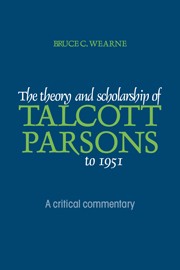Book contents
- Frontmatter
- Contents
- Preface
- Part 1 Unravelling Talcott Parsons' theoretical development
- Part 2 Talcott Parsons: the roots of his thought
- Part 3 The development of theory
- 4 Max Weber and the vision of a unified social science
- 5 The position and prospects of sociology at Harvard in the 1930s
- 6 Convergence and its construction
- Part 4 The theory
- Part 5 Parsons' theory as it stood at 1951
- Appendix Some recent publishing on Talcott Parsons' theory: a bibliographical essay
- List of references
- Index of names
- Index of Parsonian concepts
6 - Convergence and its construction
Published online by Cambridge University Press: 05 February 2012
- Frontmatter
- Contents
- Preface
- Part 1 Unravelling Talcott Parsons' theoretical development
- Part 2 Talcott Parsons: the roots of his thought
- Part 3 The development of theory
- 4 Max Weber and the vision of a unified social science
- 5 The position and prospects of sociology at Harvard in the 1930s
- 6 Convergence and its construction
- Part 4 The theory
- Part 5 Parsons' theory as it stood at 1951
- Appendix Some recent publishing on Talcott Parsons' theory: a bibliographical essay
- List of references
- Index of names
- Index of Parsonian concepts
Summary
Convergence
Parsons' intellectual search culminated in the discovery of ‘convergence’. The ‘convergence’ argument has to be understood in terms of the debate about the future of a general theory of society within economic thought. Parsons analysed the various moves afoot to relativize the encyclopaedic tendency of economics (T. Parsons 1934c: 414). Another analytical possibility had emerged within the social sciences. The Hobbes–Locke tradition of social thought was being rediscovered.
‘Convergence’ in The Structure was set forth as an analytical movement in the writings of four thinkers against the background of apparent disorder in the interpretation of modern society.
[A] basic revolution in empirical interpretations of some of the most important social problems has been going on. Linear evolutionism has been slipping and cyclical theories have been appearing on the horizon. Various kinds of individualism have been under increasingly heavy fire. In their place have been appearing socialistic, collectivistic, organic theories of all sorts. The role of reason and the status of scientific knowledge as an element of action have been attacked again and again. We have been overwhelmed by a flood of anti-intellectualistic theories of human nature and behavior, again of many different varieties. A revolution of such magnitude in the prevailing empirical interpretations of human society is hardly to be found occurring within the short space of a generation, unless one goes back to about the sixteenth century.
(T. Parsons 1937a: 5)- Type
- Chapter
- Information
- The Theory and Scholarship of Talcott Parsons to 1951A Critical Commentary, pp. 76 - 88Publisher: Cambridge University PressPrint publication year: 1990



